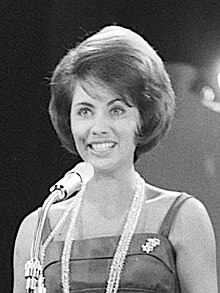Margot Eskens: Difference between revisions
7&6=thirteen (talk | contribs) m ref |
7&6=thirteen (talk | contribs) m ref form |
||
| Line 9: | Line 9: | ||
Eskens was born in [[Düren]] on 12 August 1936. In 1954, while a [[dental assistant]], Eskens won a [[Polydor Records]] talent competition with the song "Moulin Rouge". A contract with Polydor followed, and in 1955 she had her first hit in Germany with "Ich möcht’ heut’ ausgehn". In 1956 and 1957 she had two #1 hits, "Tiritomba" (which sold over 800,000 copies) and "Cindy, oh Cindy",<ref>Polydor 841 324-2</ref> which was her biggest hit, which stayed for 25 weeks in the German Singles Top 10. Several duets with {{ill|Silvio Francesco|de}}, the brother of [[Caterina Valente]],<ref>Caterina Valente's hit ''The Breeze And I (Andalucia)'' reached the Top 10 the USA in 1955; Joel Whitburn: ''Top Pop Singles 1955–1993''. Menomonee Falls, Wisc.: [[Record Research|Record Research Inc.]], 1994, pg. 620</ref> also ensued. |
Eskens was born in [[Düren]] on 12 August 1936. In 1954, while a [[dental assistant]], Eskens won a [[Polydor Records]] talent competition with the song "Moulin Rouge". A contract with Polydor followed, and in 1955 she had her first hit in Germany with "Ich möcht’ heut’ ausgehn". In 1956 and 1957 she had two #1 hits, "Tiritomba" (which sold over 800,000 copies) and "Cindy, oh Cindy",<ref>Polydor 841 324-2</ref> which was her biggest hit, which stayed for 25 weeks in the German Singles Top 10. Several duets with {{ill|Silvio Francesco|de}}, the brother of [[Caterina Valente]],<ref>Caterina Valente's hit ''The Breeze And I (Andalucia)'' reached the Top 10 the USA in 1955; Joel Whitburn: ''Top Pop Singles 1955–1993''. Menomonee Falls, Wisc.: [[Record Research|Record Research Inc.]], 1994, pg. 620</ref> also ensued. |
||
Eskens collaborated with producer/songwriter [[Kurt Feltz]] until 1961. She participated in the Deutscher Schlager-Festspiele in 1962, winning third place behind [[Conny Froboess]] and [[Siw Malmkvist]]. In 1966, she represented Germany in the [[Eurovision Song Contest]] and won tenth place.<ref>{{cite web |url=https://escbubble.com/2022/08/german-eurovision-star-margot-eskens-passed-away/ |title=German Eurovision Star Margot Eskens Passed Away! |first1=Sebastian |last1=Unterlechner |date= |
Eskens collaborated with producer/songwriter [[Kurt Feltz]] until 1961. She participated in the Deutscher Schlager-Festspiele in 1962, winning third place behind [[Conny Froboess]] and [[Siw Malmkvist]]. In 1966, she represented Germany in the [[Eurovision Song Contest]] and won tenth place.<ref>{{cite web |url=https://escbubble.com/2022/08/german-eurovision-star-margot-eskens-passed-away/ |title=German Eurovision Star Margot Eskens Passed Away! |first1=Sebastian |last1=Unterlechner |date=August 4, 2022}}</ref> |
||
At the end of the 1980s she began to record more traditional "Schlagermusik" like her album ''Mein Traumland am Wörthersee'' (1990).<ref>Frank Laufenberg / Ingrid Hake: ''Rock- und Pop-Lexikon. Vol. 1: ABBA – Kay Kyser''. Düsseldorf and Wien: ECON, 1994, pg. 471</ref> She sold 40 million records since 1956. |
At the end of the 1980s she began to record more traditional "Schlagermusik" like her album ''Mein Traumland am Wörthersee'' (1990).<ref>Frank Laufenberg / Ingrid Hake: ''Rock- und Pop-Lexikon. Vol. 1: ABBA – Kay Kyser''. Düsseldorf and Wien: ECON, 1994, pg. 471</ref> She sold 40 million records since 1956. |
||
Revision as of 10:23, 13 October 2022
You can help expand this article with text translated from the corresponding article in German. (August 2022) Click [show] for important translation instructions.
|
This article needs additional citations for verification. (October 2022) |

Margot Eskens (12 August 1936 – 29 July 2022)[1] was a German Schlager singer, most popular in the 1950s and 1960s. She continued to be a frequent guest on television programs into the 2000s.
Eskens was born in Düren on 12 August 1936. In 1954, while a dental assistant, Eskens won a Polydor Records talent competition with the song "Moulin Rouge". A contract with Polydor followed, and in 1955 she had her first hit in Germany with "Ich möcht’ heut’ ausgehn". In 1956 and 1957 she had two #1 hits, "Tiritomba" (which sold over 800,000 copies) and "Cindy, oh Cindy",[2] which was her biggest hit, which stayed for 25 weeks in the German Singles Top 10. Several duets with Silvio Francesco, the brother of Caterina Valente,[3] also ensued.
Eskens collaborated with producer/songwriter Kurt Feltz until 1961. She participated in the Deutscher Schlager-Festspiele in 1962, winning third place behind Conny Froboess and Siw Malmkvist. In 1966, she represented Germany in the Eurovision Song Contest and won tenth place.[4]
At the end of the 1980s she began to record more traditional "Schlagermusik" like her album Mein Traumland am Wörthersee (1990).[5] She sold 40 million records since 1956.
Singles
Hits that reached the German Top 20[6]
- Ich möcht’ heut’ ausgehn, 1955, #3
- Tiritomba, 1956, #1
- Mamatschi, 1956, #9
- Cindy, oh Cindy, 1957, #1
- Calypso Italiano, 1957, #9 (with Silvio Francesco)
- Wenn du wieder mal auf Cuba bist, 1957, #12 (with Silvio Francesco)
- Wenn du wiederkommst, 1958, #11 (with Silvio Francesco)
- Himmelblaue Serenade, 1958, #8 (with Silvio Francesco)
- Du bist mir lieber als die andern, 1959, #12 (with Silvio Francesco)
- Mondschein-Partie, 1959, #5 (with Silvio Francesco)
- Wenn du heimkommst, 1961, #18
- Ein Herz, das kann man nicht kaufen, 1962, #19
- Mama, 1964, #8
Filmography
- Auf Wiedersehen (1961)
References
- ^ "Margot Eskens: Schlager-Star wird auf Melaten in Köln beerdigt". Express (in German). Retrieved 6 August 2022.
- ^ Polydor 841 324-2
- ^ Caterina Valente's hit The Breeze And I (Andalucia) reached the Top 10 the USA in 1955; Joel Whitburn: Top Pop Singles 1955–1993. Menomonee Falls, Wisc.: Record Research Inc., 1994, pg. 620
- ^ Unterlechner, Sebastian (4 August 2022). "German Eurovision Star Margot Eskens Passed Away!".
- ^ Frank Laufenberg / Ingrid Hake: Rock- und Pop-Lexikon. Vol. 1: ABBA – Kay Kyser. Düsseldorf and Wien: ECON, 1994, pg. 471
- ^ Günther Ehnert (ed. (1990): Hit Bilanz. Deutsche Chart Singles 1956–1980. Hamburg: Taurus Press p. 70
External links
- Margot Eskens
- Margot Eskens discography at Discogs
- Margot Eskens at IMDb
